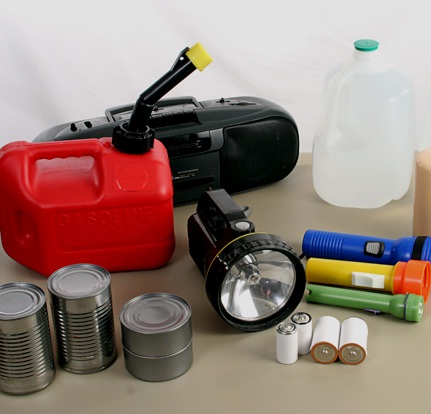As we transition from summer into fall, it’s always important to be prepared for hurricane season, which runs from the beginning of June through the end of November in the Northern Atlantic Ocean. Use the following hurricane preparedness tips we’ve put together to help you prepare your home before, during, and after a hurricane hits:
Before the Storm
 Plan evacuation routes and designate a “post-disaster contact person” that family members know to call once the storm is over.
Plan evacuation routes and designate a “post-disaster contact person” that family members know to call once the storm is over.- Stock up on items such as bottled water, canned goods, manual can/bottle opener, flashlights, battery-operated radio, nails, tarps and plywood.
- Be sure your home inventory is up to date with photographs, videos and the approximate value of your possessions.
- If you have enough advanced warning, try to make time to trim your trees and shrubs to minimize damage.
- Cover windows and doors and secure outdoor furniture.
- Make sure you have three gallons of water per family member.
- Refill your prescriptions, fill up your car with gas and withdraw a week’s worth of cash since power outages may interrupt these services temporarily.
- Place important, valuable papers like your home inventory in waterproof bags.
- If you live in a trailer home and are told to evacuate, do so immediately.
During a Hurricane
- You should have canned food for at least three days and a can opener.
- Listen to your battery-operated radio for instructions from the local authorities on evacuation and safety guidelines.
- Seek shelter in an interior room away from windows, such as a closet. If you hear the winds subside, do not assume that the storm is over. The calm may be the eye of the storm, in which the worst part is yet to come.
- If the electricity goes out, use a flashlight to see; do not use candles.
After the Storm
- Make sure you have pet food and supplies for three days.
- When inspecting your home for damage, wear sturdy shoes and protective clothing.
- Contact a trained expert to turn off damaged utilities and appliances instead of trying to do it yourself.
- Drink only bottled water until tap water is deemed safe.
- Remain inside your home until authorities in your area send out an “all clear” notice indicating that it is safe for you to leave your home.
Coverage Concerns
Hurricane season is a great time to review your coverage, but it’s important to remember that insurance companies will not allow you to lower your deductibles, increase limits or add coverage to your existing policies when a storm is threatening your area. As insurance agents, we do not have the authority to issue new policies or increase coverage limits when a severe storm warning has been issued, so it’s important to ensure that you have proper coverage in place before a natural disaster threatens your area.
Consider reviewing your NH home insurance policy prior to, or at the beginning of hurricane season to ensure that you will have adequate coverage in the event that a storm hits our area. Although a standard homeowners insurance policy includes coverage for damage resulting from a windstorm, it typically does not include flood coverage. Considering the damage that just a few inches of water can cause significant damage to your home, you may decide to invest in a separate flood insurance policy to protect your assets. It’s also important to review your coverage limits, especially if you’ve made any recent upgrades to your home, to ensure that you have sufficient coverage in the unfortunate event of severe storm damage or a total loss.
To review your existing coverage with your agent, or to get a quote for home or flood insurance, please call us today at 603-882-2766 or click below to submit our online quote request form.
At Eaton & Berube, the safety of you, your family and your assets is important to us. For additional information and hurricane preparedness tips, please subscribe to our blog.
